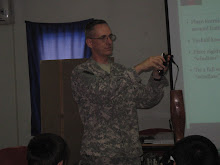
Doctor can be a very deceptive title in Afghanistan. When most people in the US speak of a doctor, they are speaking about a Medical professional with a doctorate degree in Medicine who has a license to practice medicine. Here, as with many things, the lines of differentiation blur to the point of becoming a continuum of gray space. I have been introduced to many Afghans who refer to themselves as a doctor. In truth most are acting in the capacity of a physician, but they usually do not have training in medicine. The term Doctor is used for both Medics and Medical Doctors(MD). It can be very confusing for all involved including the patients.
To be fair, the Afghan Medical Education system has had some hard knocks in the past few decades. Under the Taliban learning of most types was frowned upon and women were strictly prohibited from studying medicine. Now there are at least 4 internationally recognized medical schools in Afghanistan and several others that are not recongnized. Most schools subscribe to the European model 7 year training program. The bachelors and doctorate degree are combined into one program. Overall the system is lecture heavy and light on interactions with actual patients. Out of the 7 years, only one is spent in hospitals and clinics observing or assisting with patient care. This system produces doctors who know the lecture type details and pathophysiology of disease, but may lack the experience in practical application to patients. The most prestigious and well respected institution of medicine is Kabul Medical University. With as many as 400 students a year going through clinic rotations at Kabul hospitals, it is difficult to imagine they get the same level of involvment in patient care that we experience in the US as students.
Specialty training is also very different in Afghanistan. Specialty training is more like an apprenticeship than a program of structured learning. There is no set time to complete the training. Doctors work under a specialist (surgeon, internal medicine, anesthesiologist) until their preceptor determines they know enough to be on their own. There is no board certification testing or validation to a governing body. While this seems to work well for some specialties (surgeons in particular are widely accepted as being very well skilled) others not so much. For instance, I have seen ENT specialists who do not seem to know how to use an otoscope to check the ear canal and tympanic membranes. While this apprenticeship style of post graduate training is very different for us to accept, it works most of the time for the Afghan people. What is more it is the only system they have for right now.
Are you confused yet? If so I have adequately explained what is meant by the term Afghan doctor.

No comments:
Post a Comment